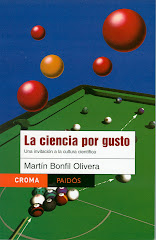by Martín Bonfil Olivera
Published in Milenio Diario, April 1, 2009
 In 1837, returning from his five-year travel on board of theHMS Beagle, and starting the two decades he would spend thinking about the "transmutation of species", Charles Darwin wrote in his notebook the phrase "I think", and then he drew a little branched outline: the first evolutionary tree.
In 1837, returning from his five-year travel on board of theHMS Beagle, and starting the two decades he would spend thinking about the "transmutation of species", Charles Darwin wrote in his notebook the phrase "I think", and then he drew a little branched outline: the first evolutionary tree. In 1859 he published The origin of species, and the only illustration he included was a more elaborate tree. Since then, the tree is evolution's dominant metaphor: a ramified process in which new species appear from pre-existent ones.
But attacking Darwin is a hobby few can resist, from fanatics that try to banish it to restless biologists that pretend to jump into fame by proving that some of his ideas are wrong.
And of course, there are a lot of aspects in which Darwin was wrong (his theory of heredity, for example, was way out of line). With time, the Darwinian theory of evolution by natural selection has been corrected, completed and fine tuned. Still, it remains as the backbone of modern evolutionary thinking.
Recently, New Scientist magazine published an article that caused an upstir, because it declared that the discovery of "horizontal gene transfer" (not from parents to descendants, but like that which occurs when two bacteria exchange antibiotic resistance genes, or when a virus injects genes from another species into us, as has happened lots of times in human evolution) is the downfall of the image of evolution as a tree.
But gene evolution is not the same as species evolution. Of course, evolution is not as simple as Darwin thought, and in some aspects it looks more like a confusing web than a tidy tree. There are branches that are weirdly connected one with another (like when some bacteria entered old cells to become our mitochondria and chloroplasts). Maybe the tree has more than one root (there is evidence for several "origins of life" that later became connected).
Maybe the tree metaphor will change, or will be substituted by a web. But from that to proclaiming "the end of Darwin" or biology's next great revolution, there's a long way to go.
 (translated by Adrián Robles Benavides)
(translated by Adrián Robles Benavides)
To receive Science for pleasure weekly
in your email, subscribe here!
 In 1837, returning from his five-year travel on board of theHMS Beagle, and starting the two decades he would spend thinking about the "transmutation of species", Charles Darwin wrote in his notebook the phrase "I think", and then he drew a little branched outline: the first evolutionary tree.
In 1837, returning from his five-year travel on board of theHMS Beagle, and starting the two decades he would spend thinking about the "transmutation of species", Charles Darwin wrote in his notebook the phrase "I think", and then he drew a little branched outline: the first evolutionary tree. (translated by Adrián Robles Benavides)
(translated by Adrián Robles Benavides)




No comments:
Post a Comment